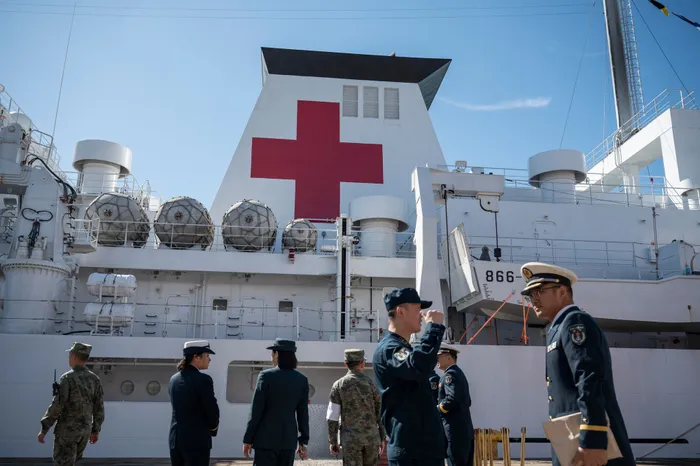China’s Peace Ark arrives in South Africa with lessons for Africa

The Chinese naval hospital ship arrived in Port of Cape Town to give the Mother City some tender loving care. Daishan Dao is a Type 920 hospital ship of the People's Liberation Army Navy of the People's Republic of China. The South African National Defence Force (SANDF) in partnership with the People’s Liberation Army Navy of the People’s Republic of China has conducted a joint national and an interdepartmental humanitarian exercise called Exercise HARMONY in Cape Town, Western Cape province from August 22 to 28, 2024. Picture: Armand Hough / Independent Newspapers / August 22, 2024
By David Monyae
China’s naval hospital ship, the “Peace Ark” arrived in South Africa for the first time since its commissioning in 2008. It will be based in South Africa for seven days to provide medical services and its highly specialised medical teams will administer treatment in local hospitals and engage in academic exchanges on traditional Chinese medicine in the Confucius Institute for Chinese medicine at the University of the Western Cape.
The ship is on its 10th mission dubbed “Harmony 2024” that will take it to 13 countries namely, Seychelles, Tanzania, Madagascar, Mozambique, South Africa, Angola, the Republic of Congo, Gabon, Cameroon, Benin, Mauritania, Djibouti and Sri Lanka, and provide medical service to local people.

Before arriving in South Africa, it departed from the Port of Maputo in Mozambique where expert teams performed 74 surgeries, including cataract operation, submandibular gland extraction and calculus extraction setting the record for the highest number of treatments in a single day. The first “peace baby” was delivered on the peace Ark in Mozambique.
The Peace Ark is a type 920 hospital ship hospital-ship equipped with cutting-edge medical technologies designed for medical humanitarian responses.
It boasts over 100 medical staff and top professionals in neurology, gastroenterology, physiotherapy, traditional Chinese medicine, infectious diseases, reconstructive surgery and burns and laboratories for diagnosis of a variety of illnesses and can accommodate about 1,000 patients at a go.
It has carried out dozens of humanitarian medical missions, treating over 200,000 patients around the world. It has visited more than 45 countries and regions, served more than 2,900,000 patients, and performed more than 2,000 major surgeries.
China considers the Peace Ark a humanitarian ambassador promoting friendship and harmony with other countries. “It is to present our image as a responsible big country,” a navy spokesperson previously stated.
China’s meteoric rise in the last few decades has coincided with foreign policy objectives and global responsibilities. Its larger economic and military capabilities naturally accord it big power responsibilities that require provision of public goods like contribution to global economic growth, global health, humanitarian support and maintaining global peace.
Chinese leaders have embraced this responsibility and asked the People’s Liberation Army (PLA) to carry humanitarian operations under its naval diplomacy in the far seas. The People’s Liberation Army Navy (PLAN) has responded by attending to humanitarian crises and provided medical support.
It took the lead in the global response to the Ebola outbreak in Sierra Leone by sending military medical teams who established a treatment Centre and a mobile laboratory. In recent years, the PLAN has deployed the “Peace Ark hospital ship” around the world to provide free healthcare in developing countries. Its first humanitarian operation dubbed the “Harmonious Mission”, took it to Djibouti, Tanzania, Kenya, and the Seychelles.
The ability to deploy such massive mobile and specialised healthcare calls for enhanced partnerships to improve African health systems and promote medical access to African populations in remote coastal and island parts of the continent.
As South Africa and the rest of Africa, embark on developing their Blue economies and Maritime resources, lessons and partnerships with the PLA can be tapped to enhance medical response capabilities.
African countries should collaborate with China to develop their own hospital ships to be deployed in times of emergency as well as to remote coastal locations. By having our own medial ships, the two countries can co-operate and provide telemedicine services to seafarers and coastal communities.
These services can greatly enhance and support offshore commercial activities like shipping, yachting, fishing and exploration beyond the African mainland. Industries such as watersports, scuba diving will heavily rely on availability of quality and available medical emergency services on our inland and offshore waters.
As the Peace Ark conducts its 10th Mission on the African coast, it is time to consider a similar initiative by South Africa and regional navies to drive cohesion and interstate medical access to improve access to healthcare at sea.
* David Monyae is the Director of the Centre for Africa-China Studies at the University of Johannesburg.
** The views expressed here are not necessarily the views of The African
Related Topics: